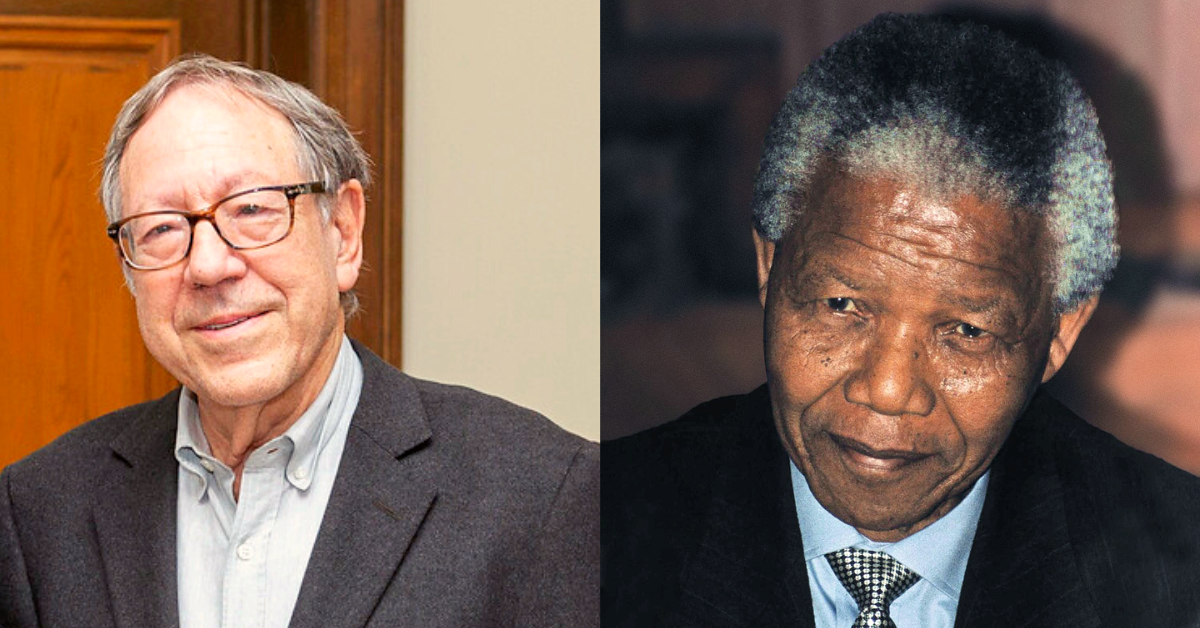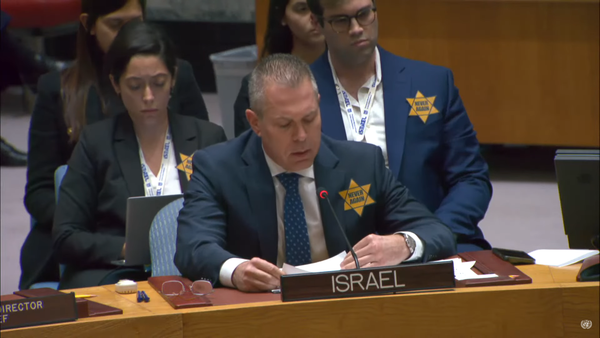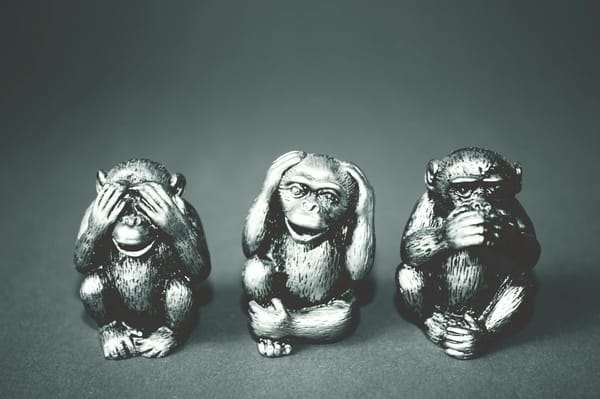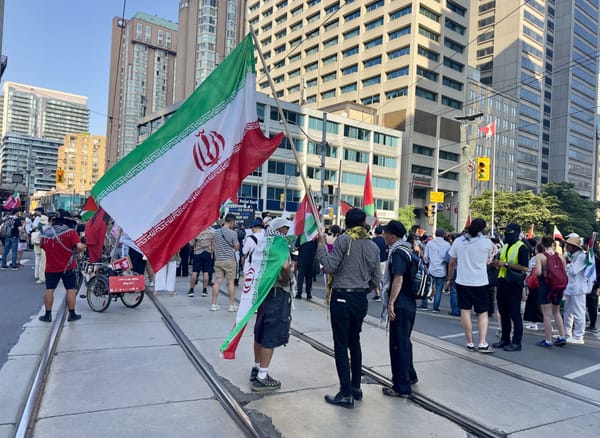Irwin Cotler has accomplished a lot in his life.
Born in Montreal in 1940, Cotler served as a member of parliament from 1999 to 2015, has been the minister of justice and attorney general of Canada, and is currently Canada’s special envoy on preserving Holocaust remembrance and combatting antisemitism.
Yet even amidst this wide range of impressive achievements, one seems to stand out for both Cotler and the media, politicians, academics, and others that adore him: his supposed work as a lawyer for Nelson Mandela.
For decades, Cotler has been applauded for this feat. It’s in all of his official biographies I could find, including in his government backgrounders. In fact, the leader of the current government, Prime Minister Justin Trudeau, even made the decision back in 2013 as Liberal Party leader to give up his seat in the Canadian delegation to Mandela’s funeral to Cotler.
The media has taken part in the decades-long round of applause as well, with a search for articles mentioning Mandela and Cotler in the Canadian Newsstream database generating more than 320 results. This includes articles with titles such as, “A tireless pursuer of justice, ex-minister Cotler takes on Putin” (National Post, October 2022); “Neither a pandemic nor retirement can slow Irwin Cotler’s fight for human rights” (The Globe and Mail, October 2020); “For retiring MP Irwin Cotler, human rights fights outlive political battles” (Canadian Press, June 2015). The claim has been repeated in international media as well, with a 2015 Reuters article headlined, “Former Mandela lawyer to join defense of Venezuela’s jailed activist,” identifying Cotler as a “human rights lawyer who helped defend Nelson Mandela.” In 2014, National Post columnist John Ivison even went as far as to claim that Cotler “was instrumental” in the 1990 release of Mandela from prison in South Africa.
There’s no question as to why this accomplishment would win praise for Cotler from all sorts of people. It certainly caught my attention the first time I heard it. One question does remain, however: Is it true? Was Cotler really Mandela’s lawyer? Unfortunately that question doesn’t seem to be of any interest to Canadian mainstream media or politicians, or even, frankly, almost all alternate outlets. That’s a shame, as the answer is nowhere near as straightforward as they’ve portrayed it to be.
I decided to take a deeper look into the matter as part of a pair of articles I’m putting together on Cotler’s political legacy — a legacy which is the subject of a documentary that premiered late last year.
To start, let’s look at Cotler’s version of events, which has remained largely consistent in the decades of him telling the story. I will cite from a 2018 Medium article Cotler wrote about Mandela for this section, as it’s both relatively recent and entirely in his own words.
I reached out to Cotler over email with a list of 12 questions and a short summary of my findings before this article was published. Cotler replied and reiterated much of what was written in the Medium article, with little added. I have included his full reply at the end of this article, and will point out questions he failed to answer as they become relevant throughout this piece. I will note here that Cotler said, “I have no interest in overstating my own role in this work, nor do I have a record of doing so,” and that he is “proud of this work.”
In his Medium article, Cotler writes that in 1981, he travelled to South Africa as part of an anti-apartheid delegation, doing guest speaking, giving lectures and meeting some important figures in the struggle. Cotler mentions that this list of figures included several South African lawyers who worked on anti-apartheid cases and/or directly with Mandela, namely Israel Maisels, Arthur Chaskalson, and George Bizos. Cotler claims that this trip sparked a “friendship with Maisels,” “a lifelong friendship” with Chaskalson and a “bond between [him and Bizos] as ‘comrades in the anti-apartheid struggle.’”
Cotler says he met with Maisels many times on this trip, and that he “was invited by him to become Mandela’s Canadian Counsel. As Maisels put it, ‘we have an excellent legal defence team for Mandela here in South Africa. What we need is someone to advocate for Mandela outside of South Africa.’”
Cotler uses an important qualifier here when discussing what he was supposedly asked to do for Mandela: be his “Canadian Counsel.” This qualifier is often, though not always, missing from descriptions of Cotler’s relationship with Mandela, with many — including Cotler later in his Medium article — merely describing him as Mandela’s lawyer or some variation thereof.
Naturally, the next question any reasonable person should have is what exactly does Canadian counsel mean here? Is it a lawyer from Canada fighting for Mandela within South Africa? Is it a lawyer representing Mandela in a legal battle in Canada? In this case, it’s neither. As Cotler hints at, the lawyers had no use for him within South Africa. Moreover, Mandela wasn’t facing any sort of charges in Canada (though the government did ban African National Congress members from entering the country without a visa), so there was no personal legal battle for Cotler to fight here.
So again, what does being Canadian counsel for Mandela mean? Well, here’s how Cotler describes what he did (broken up into two parts): “Upon my return to Canada, I intensified my involvement in the anti-apartheid struggle including participating in the public launch of a major anti-apartheid initiative, condemning the South African government ‘Pass Laws’ and involving the Canadian Council of Churches, the Canadian Labour Congress, the World Federalists of Canada, and Amnesty International, among others. Some of these groups were reluctant to expressly reference the Mandela case and cause lest his supposed association with terrorism at the time inhibit the launch. But I was involved specifically in the launch in my capacity as Mandela’s lawyer.”
There are a few points to note here. First, Cotler’s trip to South Africa where he was supposedly asked to be Canadian counsel for Mandela was in 1981, while the event he’s describing here took place in March 1986. That’s a major gap. It’s also worth noting the first mention of Cotler as Mandela’s Canadian counsel in Canadian media that I could find came in 1985. I asked him what the reason was for this gap. His response didn’t address the question. Second, I was able to find just two articles about the event at the time that mentioned Cotler by name. Neither of them described him as Mandela’s lawyer, but rather just as a “human rights lawyer” or a “civil rights lawyer.” While the news articles do seem to indicate that Cotler was one of at least three people to speak at the event, one also notes that he was just one of “hundreds of prominent Canadians” that would be taking part in the campaign.
Here’s the second part of what Cotler describes as doing in his capacity as “Canadian counsel” for Mandela: “My involvement in the 1980s included also becoming a member of the Commission for Inquiry against the Crime of Apartheid, lobbying for sanctions against the South African apartheid government, spearheaded by the [Brian] Mulroney government; advocating for Mandela’s case and cause in Parliament, campus and the diplomatic arena; advocating for Mandela to become an Honorary Canadian Citizen alongside Raoul Wallenberg; being engaged in the divestment movement in Universities re apartheid South Africa; and working on the development of a South African Constitution and Bill of Rights with people like John Harker in Canada and Supreme Court Justice Albie Sachs from South Africa”
Mulroney only became prime minister in 1984, and the South African government notes that the campaign he spearheaded started in 1985 (a four-year gap from Cotler’s 1981 trip). Cotler doesn’t mention any specific details about the role in his Medium article, nor does he even claim he played a part in convincing Mulroney to pursue sanctions against South Africa. Mulroney’s 2007 memoir also doesn’t mention Cotler even once in its more than 1,100 pages, which include multiple chapters focused entirely on South Africa and the fight for sanctions. Mandela only became an honorary citizen in 2001.
Meanwhile, South Africa’s current constitution came into effect in 1997, while the interim one before it did so in 1993, falling well outside of the 1980s and coming after Mandela was released from prison. As for Sachs, I searched through multiple books and lectures he wrote and gave about his role in developing South Africa’s constitution, and Cotler wasn’t named in any of them. The other items mentioned by Cotler here, such as involvement in the divestment movement, are ones thousands of others took part in, and while certainly commendable and important, are in no way unique nor dependent on his supposed status as Mandela’s lawyer.
I asked Cotler if he ever did any actual legal work for Mandela. His response didn’t address the question.
This is how Cotler describes his efforts. Now let’s look at their significance, and how others describe them.
To get a better sense of this, I searched through electronic copies of the following five biographies about Mandela (two of them official), three books by Mandela, and four books by three figures close to Mandela, two of them on his legal team:
- (1984) Part of My Soul Went With Him – Winnie Mandela
- (1986) Nelson Mandela: The Man And The Movement – Mary Benson
- (1990) Higher Than Hope: A Biography Of Nelson Mandela – Fatima Meer
- (1994) Long Walk To Freedom – Nelson Mandela
- (1997) Nelson Mandela: A Biography – Martin Meredith
- (1998) No One to Blame? In Pursuit of Justice In South Africa – George Bizos
- (1998) A Life At Law – Israel Maisels
- (1999) Mandela: The Authorized Biography – Anthony Samson
- (2006) Mandela: A Critical Life – Tom Lodge
- (2006) Odyssey to Freedom – George Bizos
- (2010) Conversations With Myself – Nelson Mandela
- (2018) The Prison Letters of Nelson Mandela – Nelson Mandela
Taken together, these books comprise nearly 6,000 pages, and likely more than 1.5 million words. And yet, the name “Irwin Cotler” does not appear in a single one of them. Not one of Mandela’s unofficial biographers, official biographers, wives or lawyers, or Mandela himself, seemingly found Cotler relevant or important enough to name at any point in any one of these books. Meanwhile, at least one of the lawyers mentioned earlier in this piece (Maisels, Chaskalson and Bizos) is named in every single one of the books listed, with all three of them being named in half. Remember, a National Post columnist claimed that Cotler was “instrumental” in getting Mandela out of prison.
I asked Cotler why he believes his name fails to appear in any one of these books. I also asked him if he thought the columnist’s claim was accurate. His response didn’t address either question.
Let’s take it one step further and look at speeches Mandela gave in Canada after his release.
Mandela spoke to the Canadian parliament in 1990, and Cotler says that he was “one of many” to welcome him. Cotler told me he was “present” when Mandela gave the speech, and that he also “attended the State Dinner in his honour.” Cotler isn’t named once in Mandela’s speech, not even in the section where he thanked a broad range of Canadians for their efforts in the anti-apartheid struggle.
In 1998, Mandela spoke before parliament again, and also gave four other speeches at various events. Cotler notes that he “had the privilege of listening” to Mandela in parliament. Once again, none of these speeches mentioned Cotler.
In 2001, Mandela was awarded honorary citizenship by Canada, something Cotler writes that he had long been pushing to get done. On this occasion, Cotler writes: “I was privileged to speak at the time on Mandela’s historical contribution to Canada, Canadians and the international community.” When I first read this, I thought Cotler had spoken at the ceremony. But when I searched the part of the speech he included in the article, I found that it was from a discussion in parliament in June of that year, and that Cotler was just one of 11 MPs to speak about it. The actual ceremony took place in November. Cotler is once again not mentioned in Mandela’s speech, which seems particularly strange given his supposed role in getting Mandela honorary citizenship and the fact that he was now an MP. Cotler also isn’t mentioned in Prime Minister Jean Chrétien’s speech, or in any of the print news coverage I could find about the event through the Canadian Newsstream database.
I asked Cotler why he thinks he wasn’t named or credited in any of these speeches. I also asked Cotler if he had ever met Mandela privately, and if so, could he provide a description of what the meeting was like? His response didn’t directly address either question.
Let’s fast forward a bit. I mentioned that Cotler’s story of his supposed involvement with Mandela has remained largely consistent since he started telling it. In a 2014 interview with Diplomat Magazine though, there was an interesting variation. Here’s an excerpt:
“[Diplomat Magazine]: My next question actually refers to Nelson Mandela and Anatoly Sharansky, both of whom you worked with. There are many others. What fight was most rewarding?
[Cotler]: They were all rewarding. To me, these were inspirational figures. I would come away, always, inspired from the involvement in the struggle. Of course, in the case of Sharansky, I had a much more sustained and deeper involvement because Mandela at least had a wonderful legal team in South Africa. I was really kind of a cameo presence.”
I asked Cotler about this quote, and he told me he has “no issue characterizing my time in South Africa, and my work for Mandela, as a ‘cameo presence.’”
And the next year, South Africa’s then-ambassador to Venezuela was quoted as saying (translated from Spanish): “Irwin Cotler was not Nelson Mandela’s lawyer and does not in any way represent the government or people of South Africa.” The statement came after international press had described a client of Cotler’s in Venezuela as being represented by Mandela’s lawyer. I asked Cotler if he disputed the ambassador’s statement. His response failed to address the question.
I stated earlier in this article that there are more than 320 results that mention both Cotler and Mandela in the Canadian Newsstream database, with the first appearing in 1985. The breakdown of this total of articles by decade is interesting.
In the ’80s, when Cotler was supposedly part of Mandela’s legal team and when the campaign to free him was at its peak, there were just 13 articles that mentioned both men. The ’90s saw that number increase to 24. In the ’00s, it jumped to 94. And in the 2010s, it went up to 164. Cotler has gotten far more press coverage crediting him with representing Mandela than he ever did while he was supposedly doing the work.
You may notice that the featured image for this article is one put together by a Passage team member to include both Cotler and Mandela. That was done because I couldn’t find a single photo of the two together, in Google Images, government archives, newspaper databases or anywhere else, including Cotler’s own articles and social media profiles. Does such a photo exist? I asked Cotler, and his response didn’t address the question. If you can find one, I will happily update the featured image (as long as the photo is in the public domain).
Let’s sum it up.
- Cotler says that he was asked to be “Canadian Counsel” for Mandela in a 1981 meeting with Maisels, a member of the legal team. I haven’t been able to find a single report of said meeting or offer that doesn’t rely entirely on Cotler or come from Cotler himself. Cotler isn’t named once in Maisels’ memoirs;
- When Cotler speaks most precisely about his role, he specifies that he was asked to be “Canadian Counsel” for Mandela. This is a vague phrase that seems to boil down to advocating for Mandela in Canada, not serving as his lawyer in a formal capacity;
- There’s a four-year gap between when Cotler says he was asked to be Canadian counsel for Mandela and when he both appears in the Canadian Newsstream database credited in this role and when he cites an example of doing work in that capacity;
- Cotler’s description of what he did for Mandela includes no apparent mention of actual legal work, and is comprised mostly of advocacy efforts — something thousands of others also took part in;
- Cotler isn’t mentioned by name even once in the more than 6,000 pages of 12 books written by Mandela, members of Mandela’s legal team, official biographers and unofficial biographers, and others;
- Cotler isn’t mentioned in any of Mandela’s speeches made in Canada (with one of them being to a parliament that included Cotler in it);
- Mentions of Cotler as Mandela’s lawyer are few and far between during the period where he supposedly was doing the work, but skyrocket in the decades after Mandela was freed due to people crediting him.
When I started doing research into Cotler, I certainly didn’t intend to write this article. But the issue kept coming up, and I decided to pursue it for the following reasons.
First, I believe the public deserves to know more details about a claim they’ve had pushed on them for nearly 40 years, and which the media has largely failed to provide to them throughout this period. Cotler’s association with Mandela is brought up so frequently, by media, politicians and others, that it’s clearly part of the discourse and should be treated critically.
Second, Cotler uses his supposed time serving Mandela, as well as his association with the anti-apartheid movement in Canada, to ends that I find to be dangerous.
In his 2020 doctoral thesis, Michael Bueckert (who has written for Passage before and who is co-editor of a book that includes a chapter from me) writes about opposition within Canada to boycott, divestment and sanctions (BDS) campaigns against both South Africa in the past and Israel now. Bueckert outlines three separate groups, two of which are morally and logically consistent, with the third being neither.
The first group is those who opposed taking action against South Africa for its apartheid system maintaining the same stance toward Israel. Israel is perhaps the best example of this, maintaining ties with the South African apartheid regime while the rest of the world was severing them (something Cotler doesn’t seem to mention much, at least in his work and statements that I’ve reviewed).
The second group is those who supported and took part in BDS against South Africa doing the same toward Israel. Bueckert notes that this position is common “among those who were active participants in the earlier movement (and it is widely popular in South Africa itself).”
The third, and also only logically and morally inconsistent group, is those who supported BDS against South Africa but oppose the tactic being applied to Israel. This is exactly where Cotler falls, and he sometimes uses his supposed status in the anti-apartheid fight in South Africa to establish himself as an expert in order to attempt to discredit the ongoing BDS campaign against Israel.
For example, in June 2019, Cotler’s speech at Concordia University was disrupted by protesters who decried his support for Israel. Cotler responded by, among other things, saying that having “fought against a real apartheid regime, South Africa, it is demeaning to make a comparison [with Israel].” Here we see Cotler directly use his efforts against apartheid in the ’80s to attempt to discredit a campaign against apartheid going on right now. When these sorts of arguments are attached with the claim that he served as Mandela’s lawyer, they receive more credibility for those who don’t know any better.
In the next article in my series on Cotler, I will be outlining his decades of intense advocacy for Israel that make him both a bad choice to be the government’s antisemitism envoy, but also the perfect choice for a government whose uncritical support for the state gets portrayed as the main and only real way to fight antisemitism. Stay tuned.
Here is Cotler’s response to my list of questions, in full:
“Thank you for reaching out, Davide.
As a human rights lawyer and advocate, I have worked with prisoners of conscience for over forty years, typically in close collaboration, and involving advocacy, with teams of jurists, scholars, parliamentarians and human rights defenders. I have no interest in overstating my own role in this work, nor do I have a record of doing so.
As you will be aware through your review of my documented public record, Nelson Mandela was a source of inspiration to me throughout much of my career. In 1981, I visited South Africa, where I was privileged to build life-changing relationships as a guest of the anti-apartheid movement, which included members of Mandela’s legal team, such as Arthur Chaskalson, George Bizos and Issy Maisels. Maisels, who led Nelson Mandela’s legal defence team and represented him in historic trials during the 50s and 60s, invited me to become Mandela’s Canadian Counsel. In this role, I advocated for Mandela outside of South Africa by representing Mandela’s case and cause in the public launch of a major anti-apartheid initiative in collaboration with organizations like the Canadian Council of Churches, the Canadian Labour Congress, the World Federalists of Canada, and Amnesty International. I became a member of the Commission for Inquiry against the Crime of Apartheid, advocated for the sanctions that were ultimately put in place against the South African apartheid government by the Mulroney government, and worked closely with universities on the divestment movement. I am proud of this work which I undertook as one member of a large historic movement. I have no issue characterizing my time in South Africa, and my work for Mandela, as a ‘cameo presence.’
I was present when Nelson Mandela addressed the Parliament of Canada in 1990-attended the State Dinner in his honour-as well as his visits to Canada in 1998 and 2001. When he was awarded Honourary Canadian citizenship in 2001, I had the privilege of speaking in Parliament of his contribution to Canada, Canadians and the human rights community-and his impact on me personally. In a word, my speech focused on the enduring power of his message for us all-his struggle against racism and hate-and his unwavering belief in human rights and human dignity, democracy and freedom, equality and peace.
I hope that my story has helped others, particularly Canadians, connect with his powerful legacy and will continue to speak to it with young Canadians seeking to learn from this great citizen of the world.
Best,
Irwin.”







